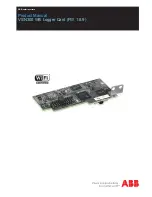
Section 5. Overview
90
5.3.6.4 SPI — Overview
Serial Peripheral Interface is a clocked synchronous interface, used for short
distance communications, generally between embedded devices. Three CRBasic
instructions provide support for the protocol. See
CRBasic Editor Help
.
U
terminals support SPI. Use of CRBasic instructions that support SPI is
considered an advanced use of the CR6, and programmers must obtain elsewhere
an understanding of the operation and details of SPI. The CR6 acts as the
master device communicating with slaves.
5.3.6.5 I2C — Overview
Inter-Integrated Circuit, generally pronounced I-squared-C or I-two-C. I2C uses
two bidirectional open-drain lines. Serial Data Line (SDA) and Serial Clock Line
(SCL) pulled up with resistors. The CR6 provides pull-ups to allow
communications, but the pull resistors are not strong enough for high speed
communications. If higher speeds are required, use external pull-up resistors.
U
terminals support I2C. Use of CRBasic instructions that support I2C are
considered advanced uses of the CR6, and programmers must obtain an
understanding of the operation and details of I2C elsewhere. The CR6 acts as the
master device communicating with slaves. See
CRBasic Editor Help
for more
information and an example.
5.3.7 Comms Hardware — Overview
The CR6 can accommodate, in one way or another, nearly all comms options.
Campbell Scientific specializes in RS-232, USB, RS-485, short haul (twisted
pairs), Wi-Fi, radio (single frequency and spread spectrum), land-line telephone,
cell phone / IP modem, satellite, ethernet/internet, and sneaker net (external
memory).
The most common comms hardware is an RS-232 cable or USB cable. These are
short-distance direct-connect devices that require no configuration of the CR6.
The CR6-WIFI, CR6-RF407, and CR6-RF451, have built in comms devices. All
other comms methods require peripheral devices; some require that CR6 settings
be configured differently than the defaults.
Go to
On-Board Wi-Fi Setup
(p. 159)
for a procedure that configures the CR6-WIFI
for Wi-Fi comms.
5.3.8 Keyboard/Display — Overview
The CR1000KD Keyboard/Display is a powerful tool for field use. The
CR1000KD, illustrated in figure
CR1000KD Keyboard/Display
(p. 91),
is purchased
separately from the CR6.
The keyboard/display is an essential installation, maintenance, and
troubleshooting tool for many applications. It allows interrogation and
configuration of the CR6 datalogger independent of other comms links. More
Summary of Contents for CR6 Series
Page 2: ......
Page 4: ......
Page 6: ......
Page 32: ......
Page 36: ......
Page 38: ......
Page 76: ...Section 5 Overview 76 FIGURE 20 Half Bridge Wiring Example Wind Vane Potentiometer ...
Page 80: ...Section 5 Overview 80 FIGURE 23 Pulse Input Wiring Example Anemometer ...
Page 136: ......
Page 454: ...Section 8 Operation 454 FIGURE 104 Narrow Sweep High Noise ...
Page 459: ...Section 8 Operation 459 FIGURE 106 Vibrating Wire Sensor Calibration Report ...
Page 535: ...Section 8 Operation 535 8 11 2 Data Display FIGURE 121 CR1000KD Displaying Data ...
Page 537: ...Section 8 Operation 537 FIGURE 123 CR1000KD Real Time Custom ...
Page 538: ...Section 8 Operation 538 8 11 2 3 Final Storage Data FIGURE 124 CR1000KD Final Storage Data ...
Page 539: ...Section 8 Operation 539 8 11 3 Run Stop Program FIGURE 125 CR1000KD Run Stop Program ...
Page 541: ...Section 8 Operation 541 FIGURE 127 CR1000KD File Edit ...
Page 546: ......
Page 552: ......
Page 610: ...Section 11 Glossary 610 FIGURE 137 Relationships of Accuracy Precision and Resolution ...
Page 612: ......
Page 648: ......
Page 650: ......
Page 688: ......
Page 689: ......













































